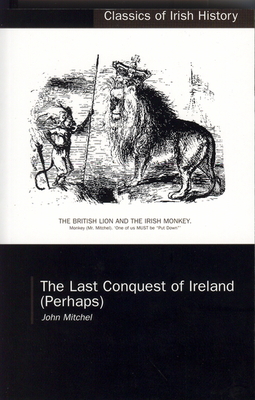The Last Conquest of Ireland (Perhaps)
Gerard Curran reviews The Last Conquest of Ireland (Perhaps) by John Mitchel, introduced by Patrick Maume, UCD Press, Classics of Irish History series, ISBN 1 904558 44, £13.95/€18 pbk

NOWADAYS, WHEN a country is invaded, as with the British and Americans in Iraq, the idea is to put a new government in place of the old and then seek an exit strategy. In the case of Ireland there were at least four conquests: Norman, Tudor, Cromwellian and a new conquest in 1800 with the Act of Union. To this day, Britain has not yet arrived at an exit strategy.
This account of the Irish resistance to the Union is particularly interesting as it is told by the leading spokesperson for 19th Century Irish separatism, - John Mitchel. The book is well known for its claim that the famine in the years '46, '47 and '48 was a deliberate act of genocide by the British government. It is up to readers to decide for themselves whether the claim is justified.
John Mitchel (1815-75) qualified as a solicitor, joined Young Ireland, wrote for the Nation and later The United Irishmen. He was influenced by Carlyle's account of the French Revolution and, like Carlyle, liberally employs contempt, ridicule, and irony when making points about Crown ministers and colonial administrators.
O'Connell's great 'Repeal' demonstrations were seen as a grave threat to the Union and Empire. The government began to look for ways of reducing the population of Ireland. The failure of the potato crop (the main source of food) was greeted as a godsend among both Tories and Whigs. As the London Times commented: "The Celts are gone - gone with a vengeance. The Lord be praised".
When the potato blight struck, Mitchel commented on the slowness of any help coming for the stricken victims. There was however a quick move to increase the number of troops and police in the country and the imposition of curfew, while an elaborate system of outdoor relief, which included the tenants giving up their land, was introduced.
Efforts by private individuals and charities in Ireland to help the starving were discouraged by government representatives. There was sudden enthusiasm in England for the study of political economy - emphasising that charitable efforts must not interfere with free trade. During the same famine years there were famines in Belgium and Portugal. Those countries did not let political economy or theories of free trade interfere with the saving of lives.
For this reviewer, this account of O'Connell's Repeal campaign and the famine years, up to Mitchel's 'trial' and transportation to Van Diemen's Land in 1848, is the best I have read. It deserves a wide readership.
Connolly Association, c/o RMT, Unity House, 39 Chalton Street, London, NW1 1JD
Copyright © 2006 Gerard Curran

